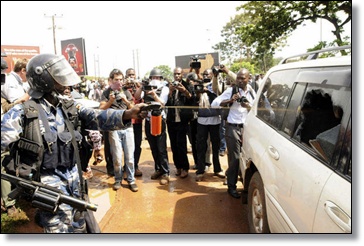East Africa: Is it Ready for Opposition?

 |
| Ugandan security officer sprays Kizza Besigye Photo courtesy |
The anti-opposition stance in the region appears to have come here to stay. Indeed, there is no a single country in the region that has never harassed opposition parties. The only difference is perhaps the scale of such harassment.
When one critically looks at what has been going on in Uganda, one thing comes into mind: sharing of practices between state apparatus in the region! For instance, is there any difference between the smashing of window screens of cars owned by members of parliament from the Chadema opposition party in Arusha on January 05th peaceful demonstration this year and on the car of Ugandan opposition leader, Dr. Kizza Besisgye during his walk-to-work campaign?
Perhaps a new thing, a creation by Uganda if you like, may be the art of spraying expired tear gas after smashing Dr. Besigye’s window. Experts have it that expired tear gas is poisonous and kills its victim slowly!
The question of expired tear gas raises question marks over the state of tear gas sprayed to demonstrators in other parts of the region. We should not forget what transpired on January 5th this year in Arusha that left three people dead, scores injured and many cars damaged.
A serious note on the need of discussion on how best governments have to handle oppositions across the regional, a Kenyan lost his life among the three stated people in Arusha.
East African countries’ constitutions pledge to respect human rights, including freedom of expression. Respective governments however tout the ‘national security’ clause to violate the same. Why should national security breach human rights?
In Rwanda, what faced Victoire Ingabire Umuhoza, chairperson of the United Democratic Forces (UDF) who challenged Kagame’s presidency and was arrested with charges of terrorism and threaten national security has a good message. Patrick Karegeya an émigré Rwanda colonel can top up the story if he explains the treatment he received from the country’s top CEO. As quoted in an interview with Robert Mukombozi; “even the army wasn’t sure about which charges they should prefer against me and where I should be jailed. For all the jail terms I served in Rwanda, the army, under orders of the commander-in-chief, detained me in solitary confinement, not allowing any family member or friend to visit me, which is extreme psychological torture going by the international human rights conventions.”
He blamed Kagame’s hand for all that he went through: “All the orders were coming direct from Kagame. All these are political tools that Kagame uses to silence his opponents.”
He even spoke of the deaths occurring mysteriously to protect the so called ‘political dominance.’
“It is not only Col. Alex Rezinde and Seth Sendashonga (former Internal Security Minister) who died mysteriously around that time. Many people especially politicians, have died under mysterious circumstances. I can’t say I don’t have information regarding those cases, but Kagame is the boss so he is in a better position to explain those assassinations and mysterious disappearances of people.”
Opposition parties across the countries are perceived as enemies. Are the issues they raise such as the rise in the cost of living by and large not felt by the society? Why do the ordinary citizens resonate with them?
Governments in Eastern Africa ought to give ear to dissenting views for efficient and collective governance. Instead of the current torture and harassment, we need to see tolerance, accommodation, room for constructive criticism and seeking a win-win situation.
By Michael Dalali.
The author is an activist, analyst, and a social development consultant based in Dar-Es-Salaam.
Email: michael@michaeldalali.com
